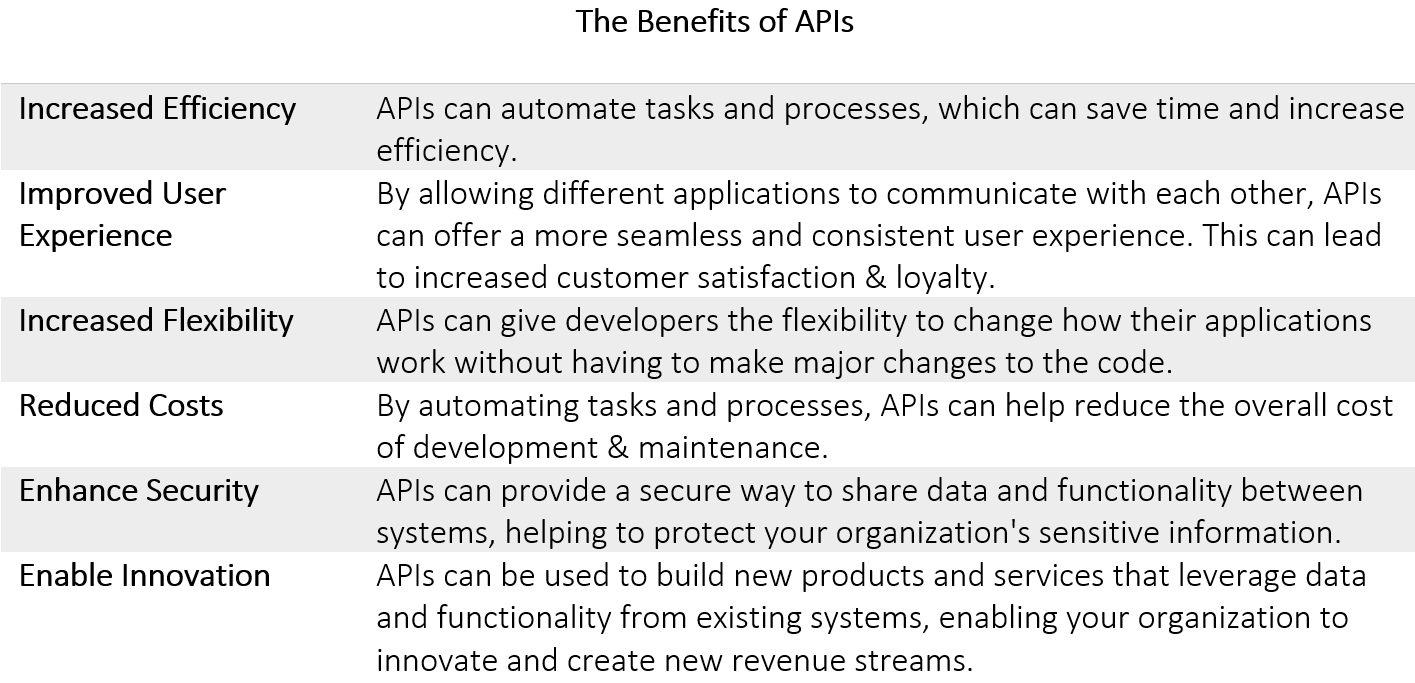Why APIs are critical for modernizing your business
In today’s fast-paced digital landscape, businesses need to constantly adapt and evolve in order to stay ahead of the competition. One way to achieve this is by using application programming interfaces (APIs). APIs have become essential tools for modernizing businesses by allowing them to seamlessly integrate different systems and applications, streamline processes, and provide better customer experiences.
An API is an application programming interface, a set of protocols, routines, and tools for building software applications. APIs define how different software components should interact with each other, allowing applications to communicate and share data with each other. In simpler terms, an API is like a waiter in a restaurant who takes orders from customers and communicates with the kitchen staff to fulfill those orders.
APIs can be either public or private. Public APIs are made available to developers by companies or organizations to allow third-party developers to build software applications that can interact with their services. Private APIs, on the other hand, are used internally by companies to facilitate communication between different software components within their organization.
APIs are critical for modernizing your business because they allow different software applications to exchange information and perform various functions. This communication is essential for businesses that rely on multiple software applications to run their operations. For example, a business may use an accounting application to track financial data, a customer relationship management (CRM) application to track customer data, and a human resources (HR) application to track employee data. Without APIs, these different applications would not be able to communicate with each other and share data. This would make it exceedingly difficult for the business to run its operations effectively.
APIs also allow businesses to integrate new applications and services into their existing systems. This is essential for businesses that want to stay up to date with the latest technological trends. For example, a business may want to add a chatbot to its website in order to provide better customer service. If the chatbot provider does not have an API, then the chatbot integration would be impossible. This would limit the functionality of the chatbot and make it less effective at providing customer service.

How to Implement an API
APIs are critical for modernizing your business as they provide a way to decouple your front-end and back-end systems. This means that your front end can be built on one platform and your back end on another, and they can communicate with each other through an API.
There are many ways to implement an API, but the most common is to use a RESTful API. To do this, you will need to define a set of endpoints (URLs) that your API will support, and then write code to handle requests to those endpoints. Some real-life examples are Twilio, Stripe, and Google Maps. If you’re not sure how to get started, contact us for step-by-step guidance.
The Future of APIs
As the world becomes increasingly digital, the importance of APIs will only continue to grow. APIs are the key to unlocking the power of the digital world for businesses. By making data and functionality available to developers, they can build applications that will drive innovation and growth.
The future of APIs is bright. They offer a way for businesses to open their data and functionality to the world, paving the way for new applications and new opportunities. In summary, APIs can help modernize business by improving operational efficiency, enhancing customer experience, enabling innovation, fostering collaboration, and enhancing security. As more businesses recognize the power of APIs, we can expect to see even more innovation in the years to come.
